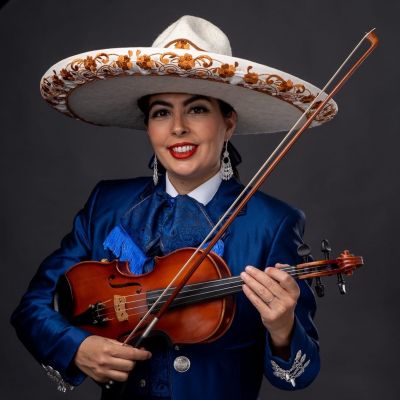
Dr. Jessie M. Vallejo
California State Polytechnic University, Pomona
Pomona, California
How difficult is it to teach music in a STEM-focused school like California State Polytechnic University, Pomona? Associate Professor of Ethnomusicology Dr. Jessie M. Vallejo finds it enjoyable to teach courses that foster creativity, problem-solving, beauty, social justice and a sense of community in this interdisciplinary space.
She revived some courses, such as the mariachi ensemble, which existed in the 1970s and ’80s, and the Music of Mexico course. She also started the mariachi program in 2016. Even though Pomona is a Hispanic-Serving Institution (HIS), “there is still a lot of work to be done to realize our potential in serving students from diverse backgrounds,” she says.
Vallejo developed two new courses: Ethnographic Field Methods and one on musical instruments. “The field methods class encourages students to develop research skills and interact with a community of musicians while connecting with some of their other disciplines and interests, such as history, anthropology, or languages,” Vallejo says.
“The organology class — Theory, History and Design of Musical Instruments — is one of the most enjoyable classes for me to teach. I have always loved the sciences, and this is my way of connecting the department more directly with Cal Poly Pomona’s engineering and science areas,” she says.
Each semester, the students in this course work with the Student Innovation Idea Labs to learn about tools and resources that may be used to build instruments, such as laser cutters or scroll saws. Throughout the class, they discuss instruments’ cultural meanings and roles in different societies, as well as social and scientific issues around instruments like sustainability of materials, endangered plant or animal species and accessibility for people with disabilities, including how to adapt instruments for different needs.
One of her favorite experiences as an educator was the collaboration between the Cal Poly’s premiere mariachi ensemble, Mariachi Los Broncos, and Dr. Julian Saporiti (a.k.a. No-No Boy). “Dr. Saporiti’s music is rich in history lessons, and his song, “The Best God Damn Band in Wyoming,” tied together some of the overlapping experiences of Asian, Mexican and Central Americans in the Pomona area over the last century,” Vallejo explains. “The song is a great vehicle to study local history and contemporary events through performance, and best of all, the collaboration was fun!”
In addition to teaching music, Vallejo works on the school’s transportation committee to address issues about mobility on campus. The committee was able to add a stop on campus for the Foothill Transit Silver Streak bus line, which has helped to shift Cal Poly from being a car-dependent campus. It has also improved transit on the I-10 corridor, reduced greenhouse emissions and made the campus more accessible. Other projects the committee is exploring include continuing to expand bus service, building a mobility hub and extending the protected bike lanes connecting campus to nearby cities.
Vallejo’s research and her own life experiences have taught her the critical importance of representation and culturally relevant programming in K-12 and college settings. “Growing up as one of the few Mexican Americans in Syracuse, New York, I was frustrated that I didn’t have opportunities to learn about my culture, especially in music programs and ensembles,” she says. “I am thankful that I can help ensure that students at Cal Poly Pomona have the opportunities that I had to fight for or seek out through study abroad experiences.”








